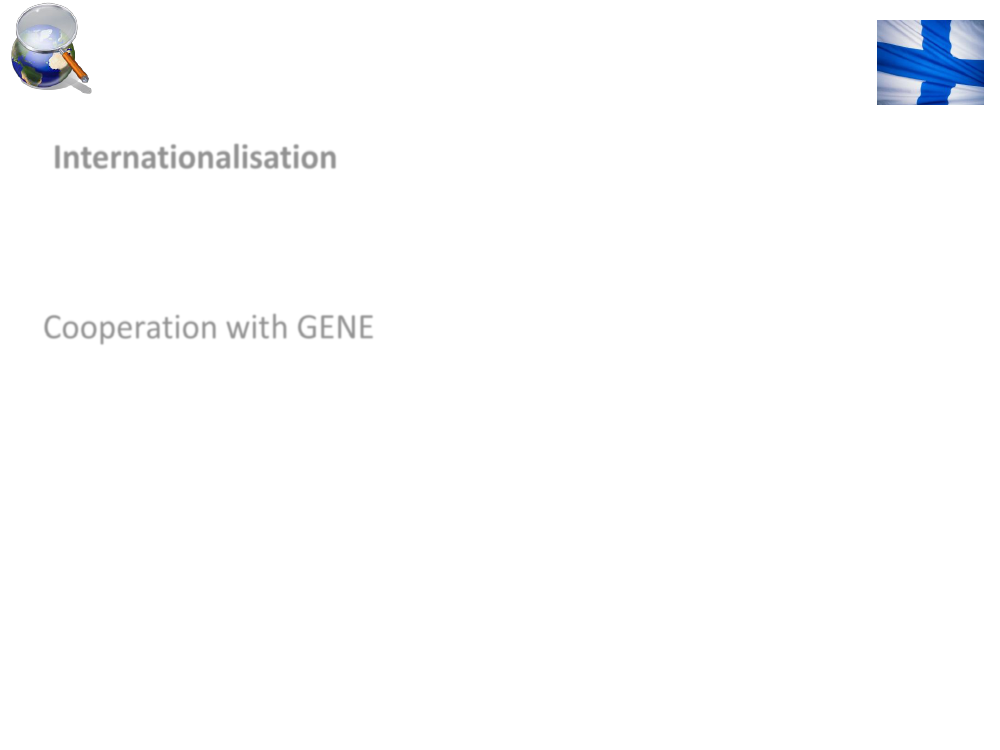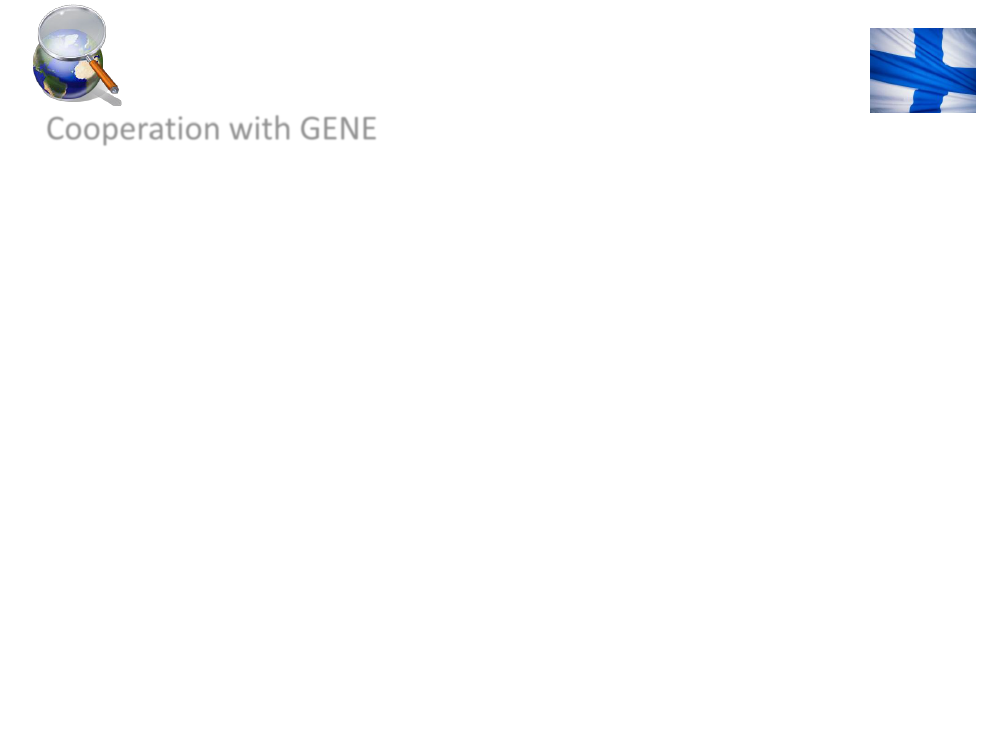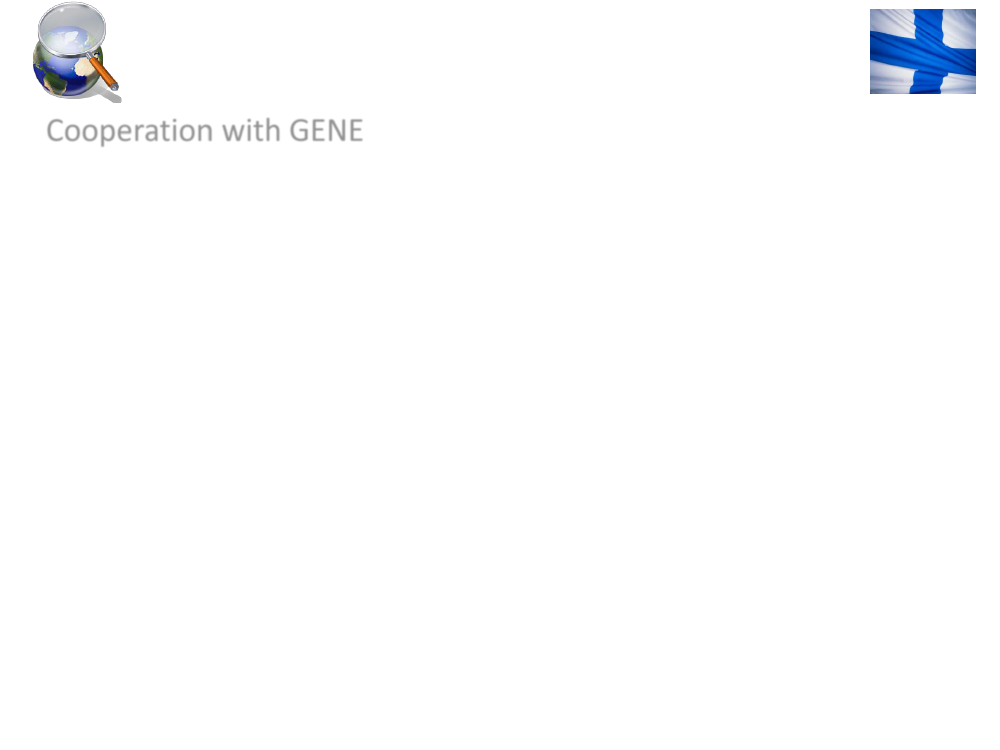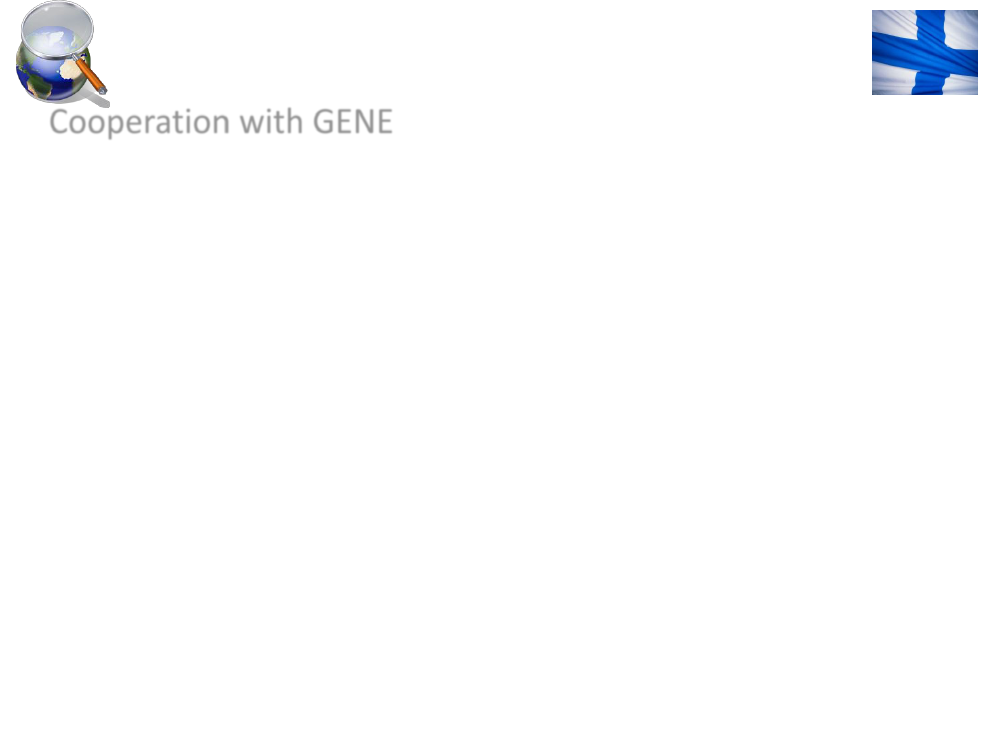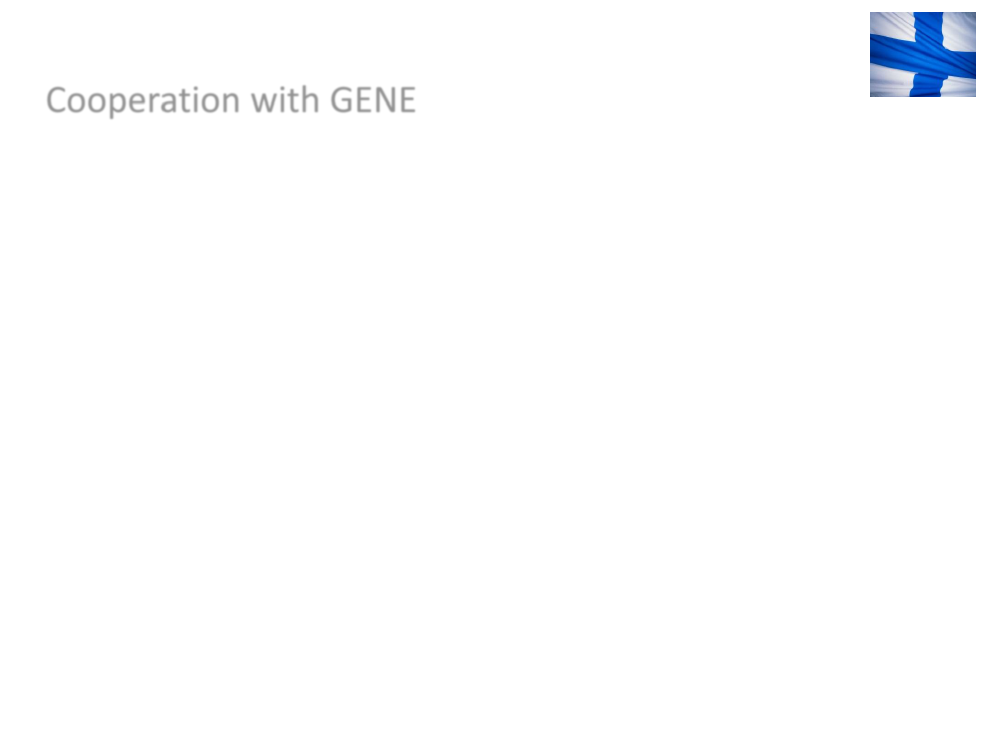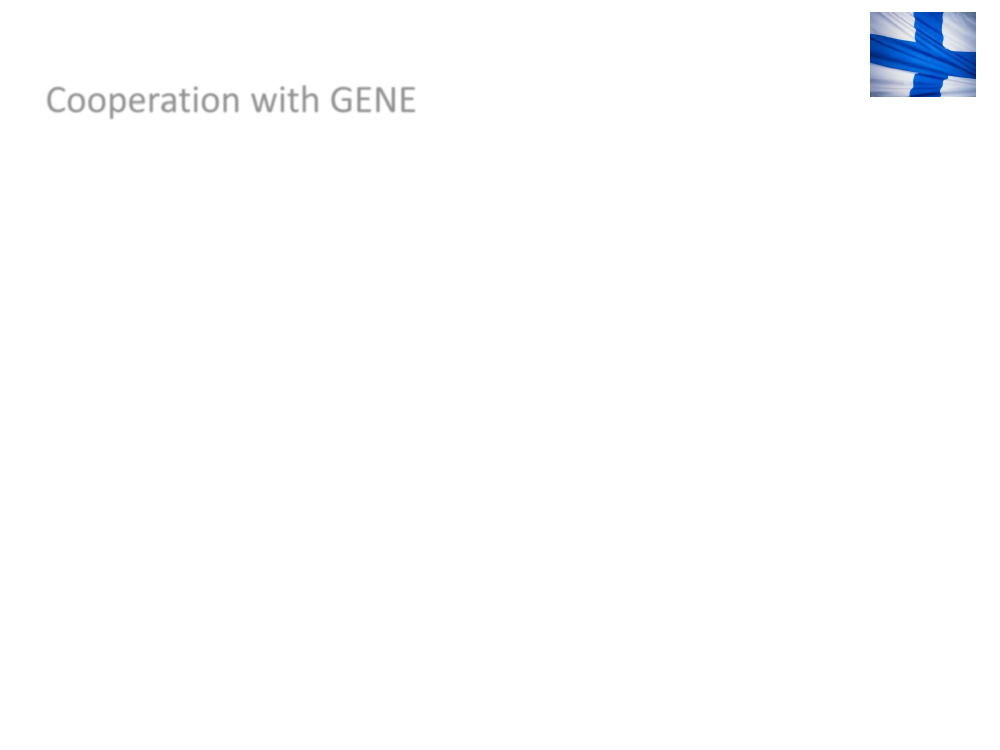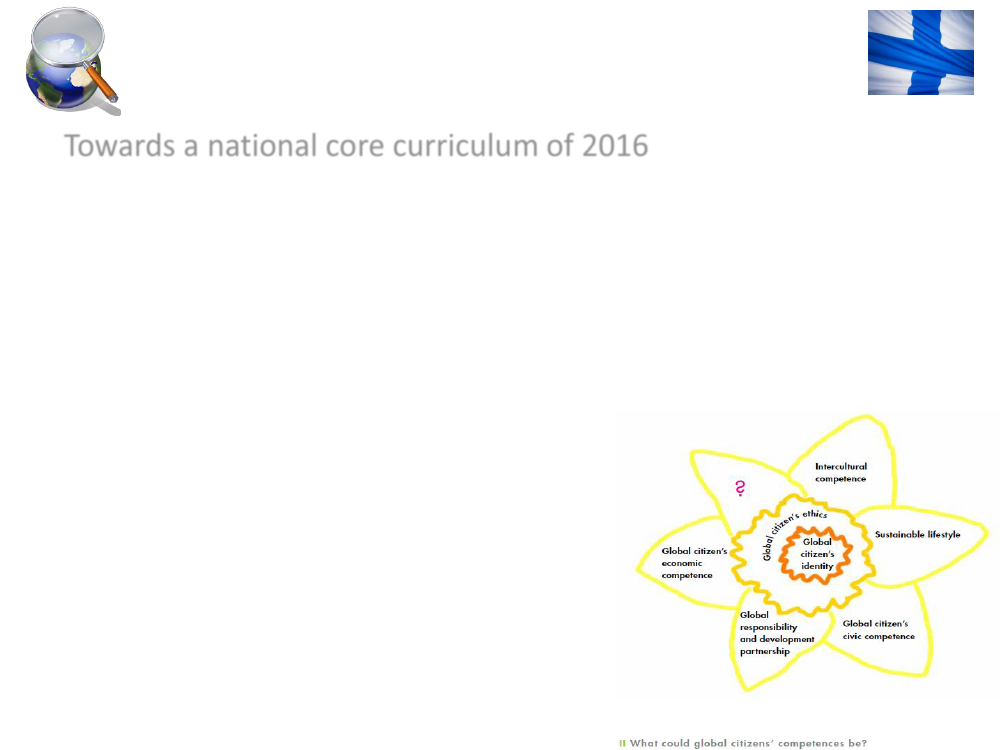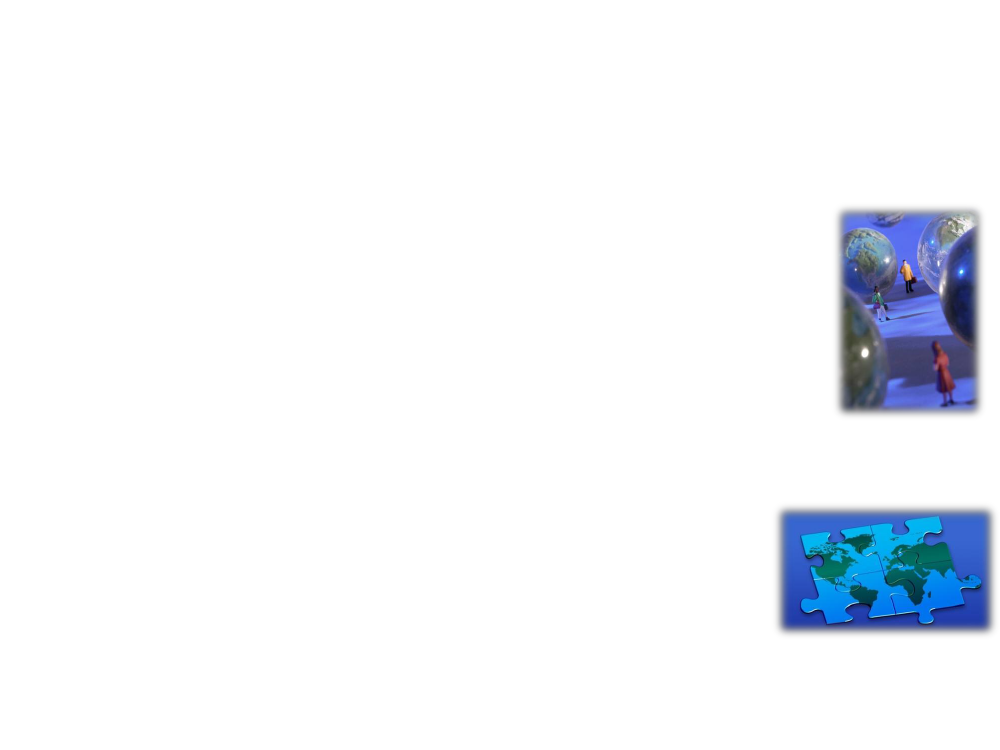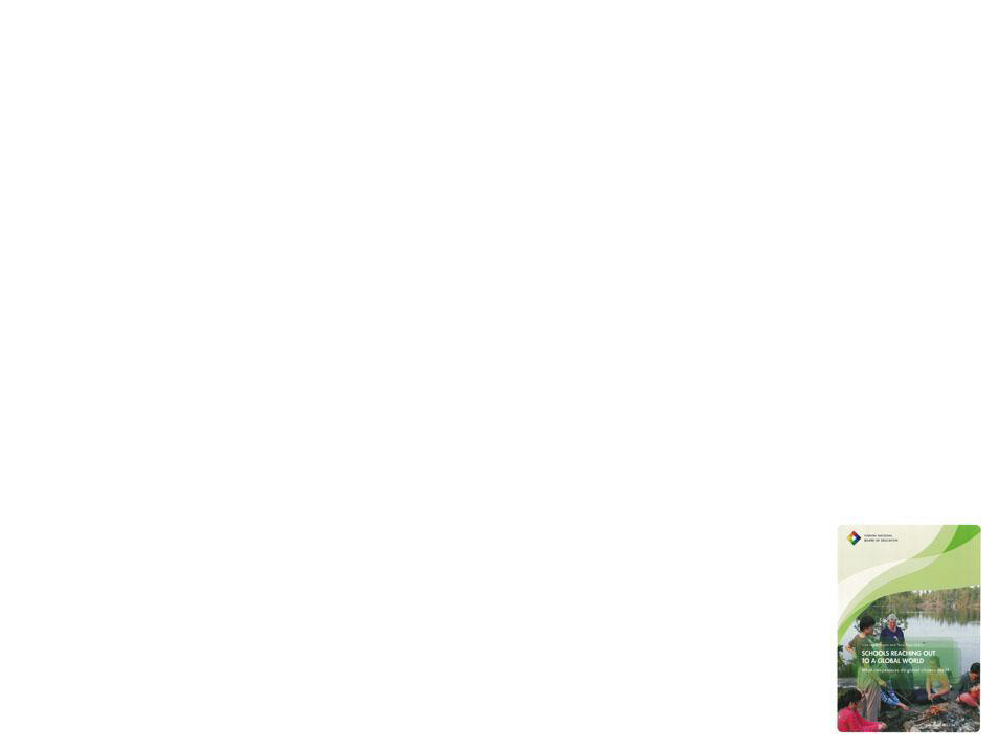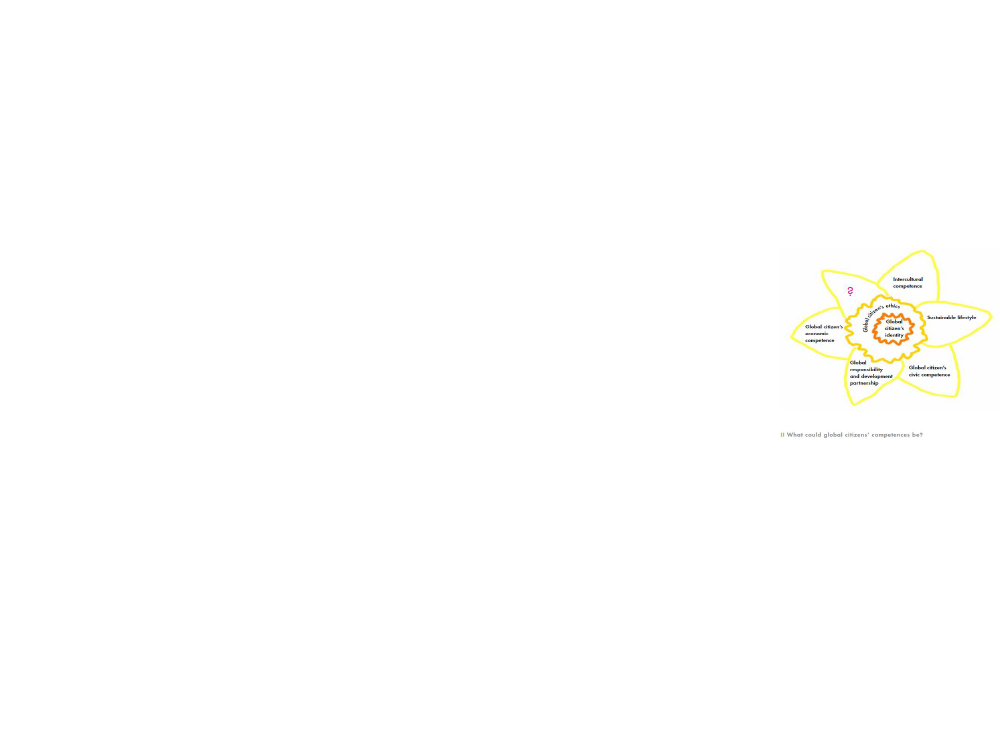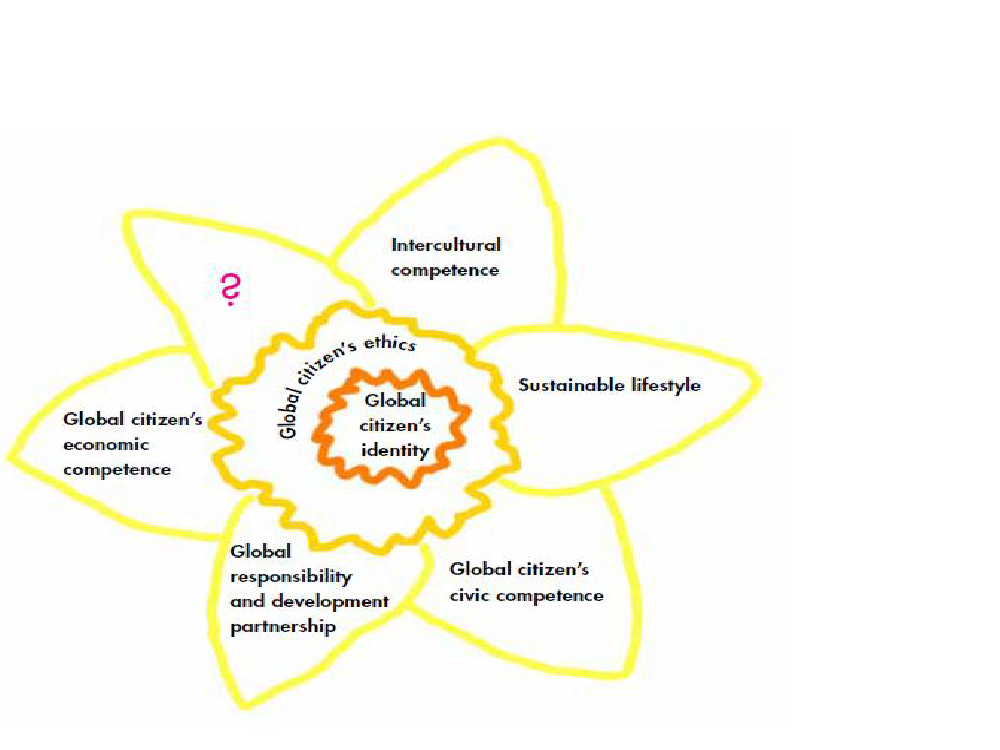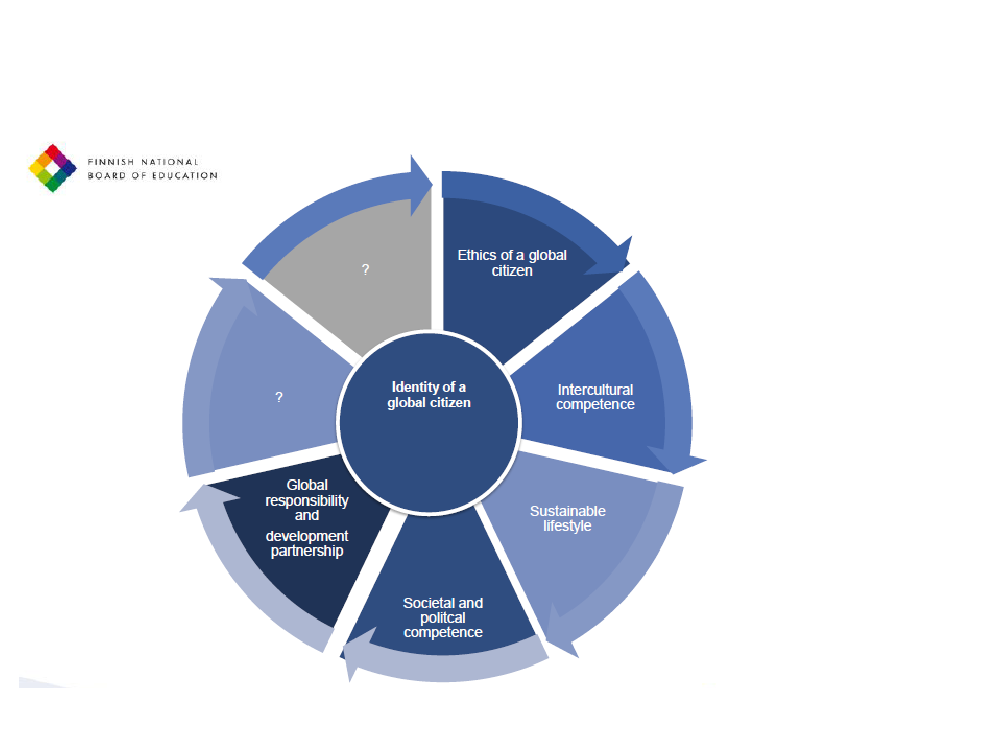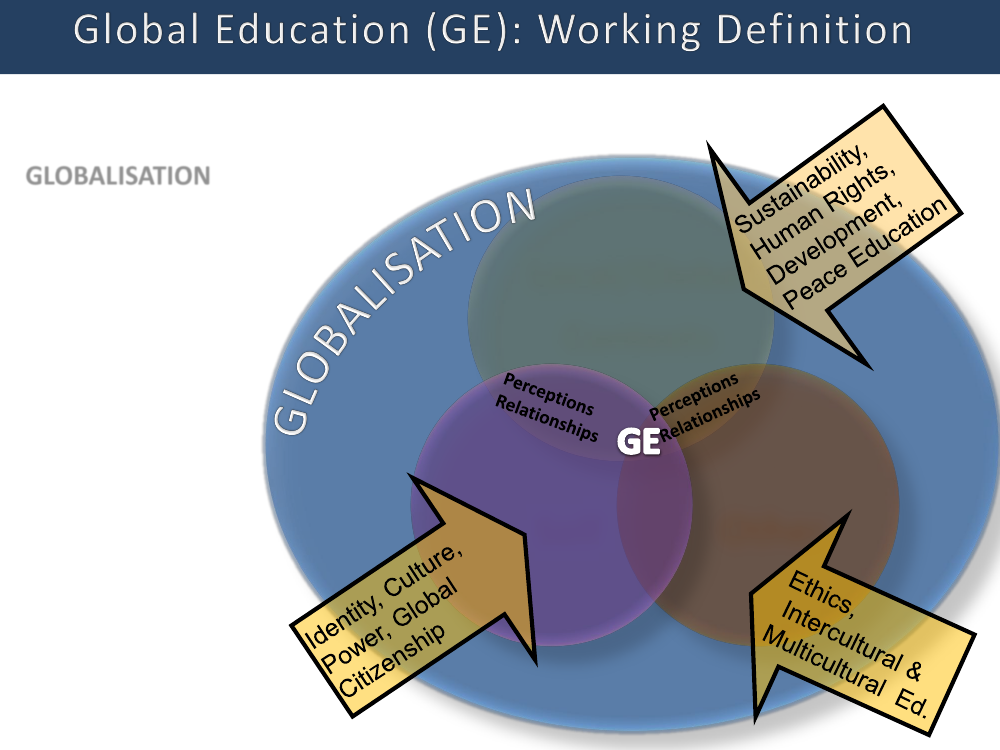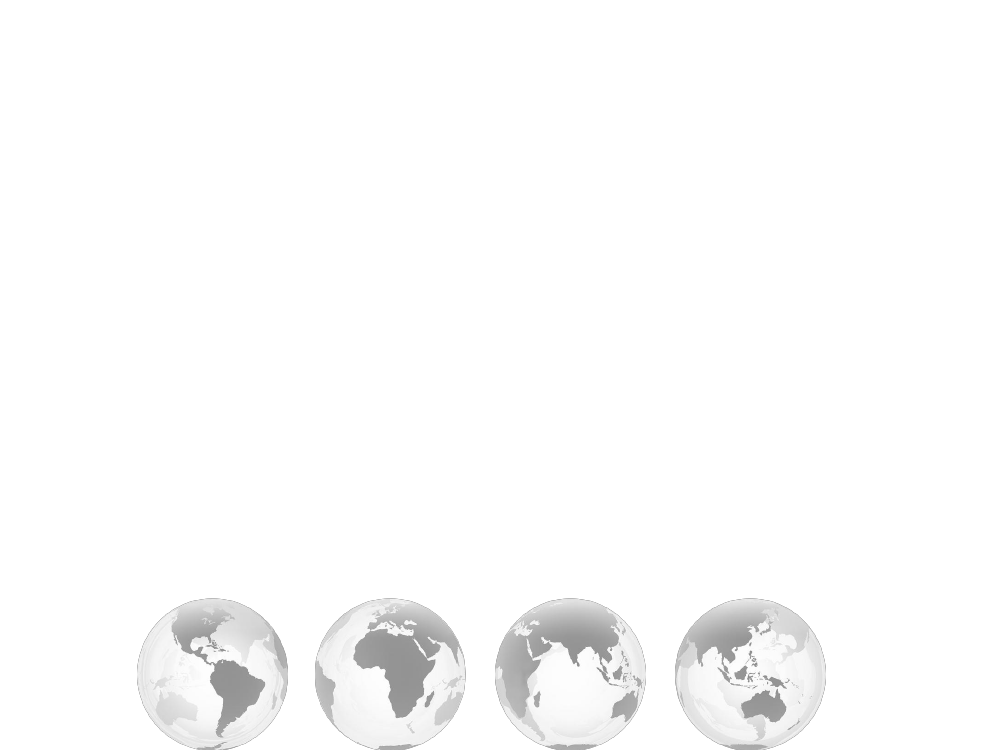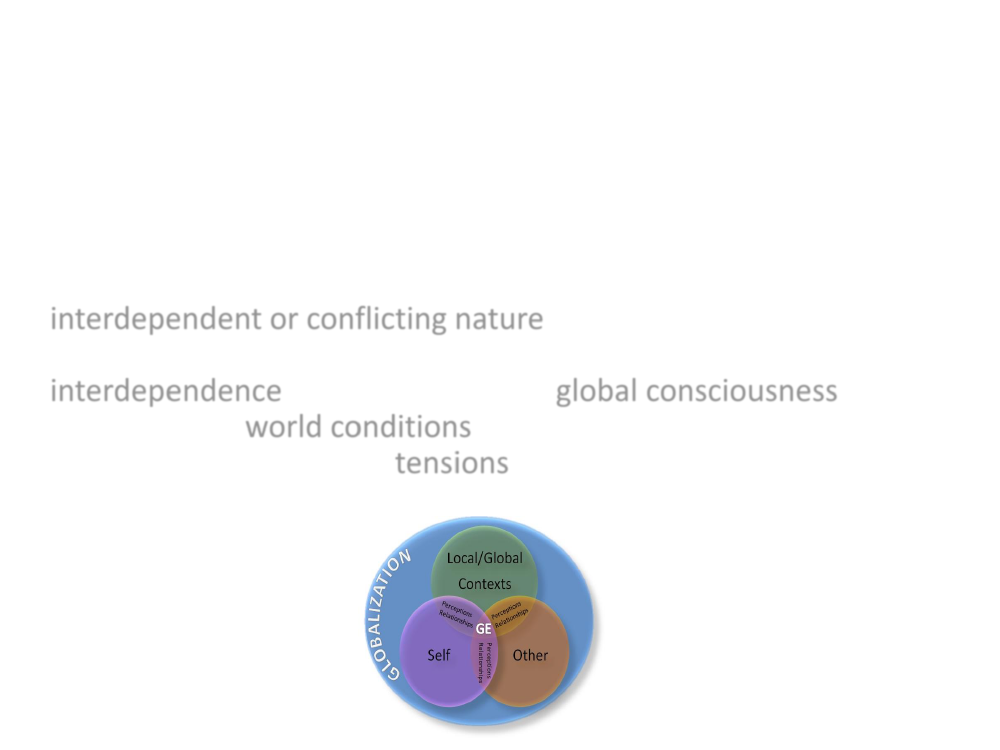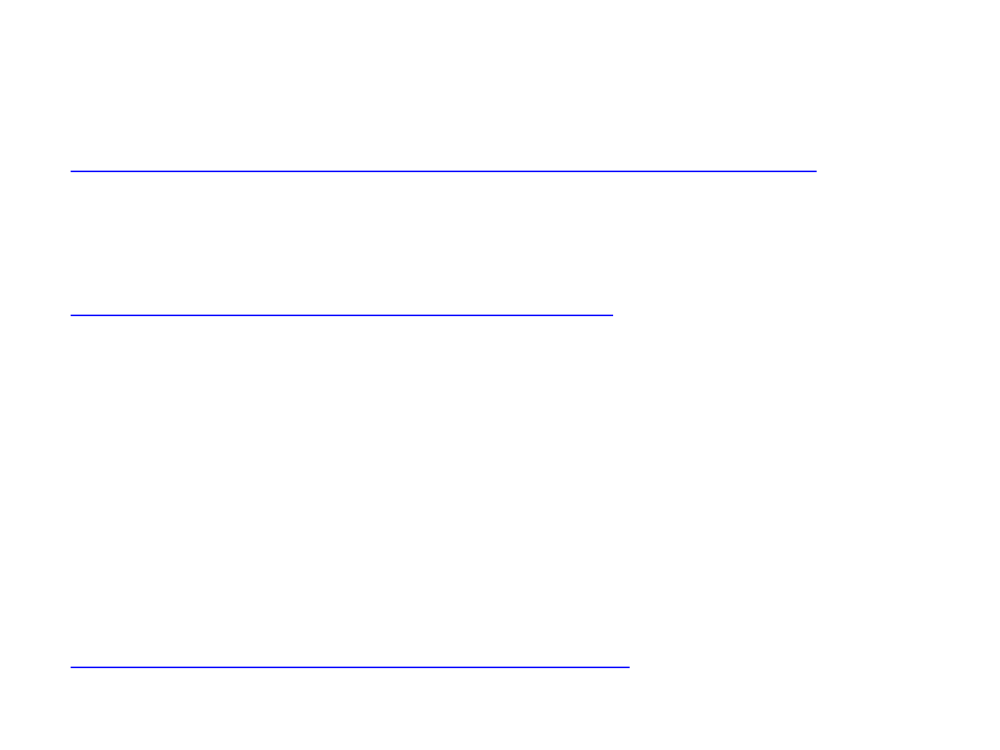Børne- og Undervisningsudvalget 2013-14
BUU Alm.del Bilag 56
Offentligt
Mobilizing Support forGlobal Education:The Case of FinlandDr. Karen Pashby withProf. Vanessa de OliveiraAndreottiUniversity of Oulu, FinlandConference on GlobalEducation, CopenhagenNov. 7, 2013
Overview:Mobilizing Support for Global Education in Finland1.Finnish Context:*The “Finnish Miracle” of Education: History of Education as Nation-building;High Profile of Ministry of Education and Teaching Profession*6 Stages of Global Educationin Finland
2.Highlights of the Multi-Stakeholder Process:*Viewsfrom the Chairs in Global Education(Uni. of Oulu)*role of the academy + importance of specific people to champion GE*on-going dialogue approach
*peer review process –where it all comes together*conceptual ambiguity- constraints and possibilities
3.Global Education On the GroundAppendix I: Summary of the Peer Review of Global Education 2010Appendix II: Conceptual Framework for Global EducationAppendix III: Testimony of a student teacher in Finland about Global EducationAppendix IV: Example from Canada References and Contact InformationReferences and contact information
Key Themes:Context+ Multi-Stakeholder ApproachImportance of NGOs, multiple government ministries,teacher organizations, and universitiescoming together
Strong, stable national consensus aroundvision for educationHigh profile of Ministry of Ed,and working well with MFA
Specificrole of the academy:the university is not directing what todo but is central to keeping the debate open and to keeping policymoving and on a critical edgeProf. Vanessa de Oliveria Andreotti, Chair of Global Education:“Thebest thing about Finnish system is that there is aninfrastructureto see policy as an ongoing dialogue to let the policyrespond to the ongoing complexities”Well placed advocates such as Ministry of Education’sLiisa Jääskeläine
FINNISH CONTEXT•Sparsely populated parliamentary democracy•Described as culturally monolithic(ethnicity & religion)–diverse: languages, dialects, political views &forms of living(regional)
•Geo-politically b/t East & West;influenced by Russia & Sweden•Traumatic past (Winter War; Civil War)•“the impoverished country *built+ economic growth and policiesofsocial responsibility”(Räsänen, 2009, p. 26)
Myth of one nation, one language, one culture was centralRights of older minorities (Swedish speakers, the Sami andRoma) better recognized recently•biggest immigration= from Russia, Estonia, Sweden (includingreturning Finns)•then= Somalia, Iraq, Great Britain, Germany, Iran, formerYugoslavia, the US, Turkey
FINNISH CONTEXT:The Finnish Miracle of Education•70s+80s= comprehensive school reforms based onnationalconsensusaroundquality education for all•Education iscentral to nation-building;insignificantdifference in distinct governments’ approach to education= sharedideals•Ministry of Education has a veryhigh profile;teaching is a respectedprofession•Education as key-driver of success= “helped speed the country'ssocial and economic internationalisation in the 1990s”(Räsänen, 2009, 26)•HighPISA ranking:-strong educational infrastructure; respect forteachers and their professional autonomyStill some work to do (e.g. recent PhD study showing range of scoresbetween Helsinki schools based on socio-economics)
excellent platform to build on for global education
•Education is expected to respondto challenges of increasingpopulation diversity, international migration and cooperation +changes associated w/ globalization (econ, social, cultural, ecological)(Räsänen, 2009)
FINNISH CONTEXT:The Education System•Strongest national steering instrument is thenational core curriculacreates regulations that form basis for development oflocal curricula, teaching materials, and nationalmatriculation examinationsdistinct steering system in Finland:no nationalstandards, inspections, nor external ranking ofschoolsaholistic curriculumestablished via long andextensive participatory process
FINNISH CONTEXT:6 Stages of Global Ed(Jääskeläinen, 2013)1.) 1960s-early 70s:UNDHR=ethical foundation ofschool reform=equality of all2.) Mid-1970s-late 80s:UNESCORecommendations onInternational Education= focus onpeace education
3.) Early 1990s: Focus onEuropeand on theenvironmentin curricula(Finland joined Council of Europe in1989, EU in 1995)
*1995: Ministry of Foreign Affairs (MFA) cooperateswith Finnish National Board of Education (FNBE) oninternational ed and later global ed
FINNISH CONTEXT:6 Stages of Global Ed2000s:4.)Internationalisationcoversall aspects of social development–National core curriculaof 2003 and 2004-international ed no longer expressed separately in curricula documents-encouragement of NGOs being invited into schools5)Cooperation with GENE:*multi-stakeholder approach &UNMDGs
TheMaastricht Global Education Congress(2002) defined globaleducation as“Education that opens people’s eyes and minds to the realities of theworld, and awakens them to bring about a world of greaterjustice, equityand human rightsfor all”-understoodin theFinnish contextas“pupils *must+ become empowered torecognise attitudes and ethical
values relating to global issuesand become sensitive to the demand forjusticeand appreciation ofdiversity”(Heino & Houtsonen in FNBE, 2011, 110)
FINNISH CONTEXT:6 Stages of Global Ed5)Cooperation with GENE (continued):
•Parliamentary Assembly of theCouncil of Europe ResolutionJanuary 2003 calling on member states to:“promote global education to strengthen public awareness of sustainable
development, …global education is essential for all citizensto acquirethe knowledge and skills to understand, participate in andinteractcriticallywith our global societyasempowered global citizens”(Parliamentary Assembly Resolution 1318, January 30th, 2003; par 20, xii)
Key supporterin MFA (Christian Sundgren) led to Finland being akey actor in GENE from its beginningNorth-South Centre of the Council of Europe increasingly active
FINNISH CONTEXT:6 Stages of Global Ed5) Cooperation with GENE (continued): *multi-stakeholder approach-GENEreviewoccurred in 2004-recommended the development of anational strategy on GlobalEducation(Jääskeläinen, 2013)= rights-based approach= not just NGOs but policies of government must be involved-GENE commended the Finnish Ministry for Foreign Affairs-but must be inter-ministerial: education, environment, trade andindustrywithin a year of GENE report, the Ministry of Education acceptedthe recommendations into a document, a national strategy, calledGlobal Education 2010
FINNISH CONTEXT:6 Stages of Global Ed5) Cooperation with GENE (continued):*from international to global education•switch of terms: “International cooperation is not at allrepresentative anymore. It is not enough anymore that wefocus in education (international education) oncommunication or communication between differentpeoples….We must learn to understand[global] phenomenaand their interrelationshipson the micro and macro levels,in our everyday lives as well as global and local times, and
we must also learn to act ethically”(Jääskeläinen, 2013, 90)
FINNISH CONTEXT:6 Stages of Global Ed5)Cooperation with GENE(continued): *role of academicsProfessorship in Global Educationat University of Oulu•Rauni Räsänen,(currently Professor Emerita):•Contributed a strong position on thetransformativecharacterof Global Education•Successor:Vanessa de Oliveira Andreotti;•Usespostcolonial perspectivesto raise the importance ofethical examinations of how even well-intended GE canreproduce the very unequal power relationsat the heart ofmany global problems
FINNISH CONTEXT:6 Stages of Global Ed5)Cooperation with GENE(continued): *role of academicsProfessorship in Global Educationat University of Oulu-plays a significant role in shaping the policy dialogue and content•Vanessa de Oliveira Andreotti;As expressed byLiisa Jääskeläinenof the Ministry of Education:“weneed to learn to understand development…globaldevelopment, from a variety of angles, thus breaking free of ourtendency of seeing the place where we are as the centre of focus.Vanessa Andreotti challenges us to ask ourselves inwhat kind ofstory – or as whose story – Global Education can be seen.Weare supposed tolearn to see the world also “through others’eyes””(Jääskeläinen 2013, 91).
FINNISH CONTEXT:6 Stages of Global Ed6.)Towards a national core curriculum of 2016•2010: FNBE planned a new approach to promote GlobalEducation with the MFA=As a Global Citizen in Finland•identity of a global citizen is based onethicswhich is key tomain competencies:civic competence, global responsibilityanddevelopment partnerships,sustainable lifestyle, interculturalcompetenceandeconomic competenceThese competencies make up the preliminaryunderstanding of the national corecurriculum decisions for 2014(Jääskeläinen, 2013)
Highlights: Multi-stakeholder + Peer Review
•Peer-review and critique through the multistakeholderapproach(e.g. Rauni Räsänen wrote up an extensive peer review of the GlobalEd 2010 program- see appendix 1)
•Enlarges possibilities for how global education canengage with living and thinking in contemporary societycomplexities, uncertainties, pluralities and inequalitiesequity and ethics at the centreany approach not open to these conversations will closedown
•Vanessa de Oliveira Andreotti: “partof theFinnishMiracleis to take the profession of teachers veryseriously as well as NGOs and governments and try tointegrate their work with academic knowledge”
Vanessa’s perspective as Chair of Global Education:
Highlights: On-going Process Approach + Dialogue+Importance of Key Players
•Dialogue:the government determines theunderstanding of global ed in their policy and thenlistens to theuniversitywhen itcontestsit andadjustsaccordingly•Conferences include arange of perspectives;andcritical engagementis encouraged•The Finnish Miracle isnot the exportable productbutthepossibilitiesopened by a different kind ofprocesses;Theinfrastructure for multi-stakeholder process and peerreview must be in place; yet this depends on keyindividuals to mobilize it in an effective way
Conceptual Challenges & Opportunities•Recent evaluation of Finland’s Global Education 2010initiative found:Theimportance of GE is unquestioned; but theknowledge of what GE is and what it does isweak(Räsänen, 2011. See Appendix I for summary of other findings)
•Pros and cons of inconsistent/ambiguousconceptualization of Global Educationdifficultfor logistics and mobilizationclosingit = part of the beauty of the process islost, and the ambiguity might allow for aplurality of voices•RauniRäsänensays the key is themultidimensional natureof the conceptremaining intact: an “education for a meaningful,ethical and sustainable future for all”
Conceptual Challenges & Opportunities•She and Vanessa, along with some others, createda working definition(see also appendix II)“Globaleducation is anethicaland educationalimperative in a wold characterized bycomplexity,uncertainty,inequalityanddiversity.Globaleducation teaches understanding ofprocesses,perceptions, relationshipsandflowsthrough thedynamicsin the interface betweenthree spheres:the self,the Otherand interactions betweenlocaland global contexts”
Global Education: “On the Ground”From Vanessa’s perspective: pockets of amazing work-e.g.:intercultural educationcourse created at Universityof Oulu with afocus on interculturalism and global educationinteacher education-thoughit’s somewhat inconsistent
-student teachers produce amazing ideas about the disposition ofteachers of global education (see appendix III)•teaching that exposes and engages the four facets of globaleducation and analysis of the origins (complexity,uncertainty,inequalityanddiversity)for example in inequalities, focus is understanding ourcomplicitydeepunderstanding of the reproduction of inequalitiesand questions of complicity which creates in them acommitment- teachers•The overall process of Global Education in Finland enableda renewed commitment to doing things differently
Moving Forward: Mainstreaming Global Education•Recent initiative calledAs a Global Citizen in Finland(FNBE, 2011)coordinated by theFNBE,funded by theMFA•Work in schools with experiences steered through seminars withGENE, MFA, MofEd
•Purpose:articulate key premises, challenges and opportunities interms of education for global citizenship in a globalized worldfocus on greater justice and sustainability while developingeducation suitable for young people’s experiences
•Projects:skyping with students in EU countries, interdisciplinarylinks for critical understanding of globalisation, NGO workshops,partnering with schools in the Global South, taking tripsto France, exchange programs with China, writingletters to peers in Senegal (etc.)
•developing global citizenship competencies that can bebuilt intocurriculum reformwhich is occurring now
New Curriculum DraftPrinciples of planning the core curriculum
In outlining the national core curriculum, these perspectivesare considered for all dimensions (objectives, content andpractices):•Building on strengths•Sustainable future as an objective•Equality in all areas of education•Meeting pupils' needs and supporting wellbeing and otherprerequisites for learning•Coherence and consistency of basic education, learningcontinuums•International aspects and global responsibility•Awareness of languages and cultures, regarding them asrichness•Technological change, working with knowledge•Challenges for broad-based, multimodal literacy(FNBE, n. d.)
The Process Continues•In her introduction to the book that wascompiled as a result of theAs a Global Citizenin Finlandproject, Liisa Jasskelainen ends withreference to Vanessa de Oliveira Andreotti’swork;“Role of education in a world of uncertainty”•“It is now essentially admitted thatdevelopment is uncertain. This being the case,the role of education is toteach learners toquestion things, build knowledge throughinteraction, open up a variety of views, dealwith uncertainty, and act ethically”(FNBE, 2011, 9)
Framework for Global Competencies:An on-going process towards global citizenship“We also considerlearning challengesindicated by aquestion mark to beimportant. Amidst therapid change of theworld, evencompetence cannotbe static definitions.Challenges … seemto be growingconstantly”(FNBE, 2011, p.75)
(FNBE, 2011, p. 74)
Framework for Global Competencies:An on-going process towards global citizenship
“It is an unfinishedmodel: “Amidst the rapidchange of the world,even competence cannotbe static and it istherefore necessary toleave room forcontinuous reflection,new questions anddefinitions”(FNBE, 2011, p. 75)
(Jääskelaine, 2011, slide 12)
Review of Key Themes:Context+ Multi-stakeholder ApproachImportance of NGOs, multiple government ministries,teacher organizations, and universitiescoming together
Strong, stable national consensus aroundvision for educationHigh profile of Ministry of Ed,and working well with MFA
Specificrole of the academy:the university is not directing what todo but is central to keeping the debate open and to keeping policymoving and on a critical edgeVanessa de Oliveria Andreotti, chair of Global Education:“Thebest thing about Finnish system is that there is aninfrastructureto see policy as an ongoing dialogue to let the policyrespond to the ongoing complexities”Well placed advocates such as Ministry of Education’sLiisa Jääskeläine
Appendix I: Peer Review of Global Education 2010Rauni Räsänen (2011):wrote up the report on the Global Education 2010 program-it was a review of initiatives coming out of the GENE reviews (2004,2011)-awareness of program and impact = modest; but extensive evidence thatglobal education being taught-value in the national document being issued as a guideline, andparticularly the holistic approach was appreciated-recommendations moving forward included clarifying roles and increasedialogue between ministries concerned (Ministry of Education andCulture, Ministry of Foreign Affairs, Ministry of the Interior, Ministry ofthe Environment, and Ministry of Employment and Economy)-creating a national mechanism for coordination and monitoring-devise an evaluation system with Ministry of Ed and Culture as keysteering role-need to recognise more strongly the role of varied civic organisations-continue the terminological dialogue around global education terms,particularly around global education and education for sustainabledevelopment to optimise synergy
APPENDIX II: Conceptual Challenges &Opportunities•Contribution of a working definition of global education by agroup of academics includingRäsänen and Andreotti“Global education is an ethical and educational imperative in awold characterized by complexity, uncertainty, inequality anddiversity. Global education teaches understanding of process,perceptions, relationships and flows through the dynamics in theinterface between three spheres: the self, the Other andinteractions between local and global contexts” (see figure onnext slide)
an ethical and educational imperative in a w orld characterized bycomplexity, uncertainty, inequality, & diversity
GLOBALISATION:processes & flows•advanced capitalism•reconfiguration ofpolitical power,•vast internationalUncertaintymigration,•ecological fragility,•technologicalinterconnectivity,Diversity•cultural hybridity(Todd, 2008)
Local/GlobalContextsInequality
PerceptionsRelationships
Self
Other
Complexity(Andreotti, Souza, Räsänen & Forghani, 2007)
Conceptual Ambiguity + Open Dialogue Process + Multistakeholder approachLiisa Jääskeläinen draws on Vanessa de Oliveira Andreotti’s strong theoretical work in hercurriculum development agenda:Andreotti (2013) theorized 3 frames of reference from 12 different perspectives, forinterpretation of globalisation and global education•Liberal humanism:common humanity imperative, universalism of the good life; basisfor justice and progress is nation-state internationalism as cooperation; members ofequal nations coming together in rational consensus; better more prosperous futurefor all•Technicist neoliberalism:economic imperative, free markets and corporateresponsibility; basis for justice and progress is economic growth; members of anequal, borderless market economy make ethical rational choices (in favour of capitalaccumulation, property ownership and unrestricted growth) that benefits those whoparticipate in the market•Postcolonail possibility(yet-to-come): responsibility for harm imperative, justiceinstead of charity, un-coercive dialogue, mutuality, solidarity and reciprocity; focus ison members of a diverse global community – who are insufficient in themselves andtherefore interdependent – working together in solidarity and mutual accountability*recognition in Finnish context that the focus has beenliberal humanism(Jääskeläinen inFNBE, 2011, 125) =now have opportunity to look at otheralternatives
Appendix III: Student Teachers Engaging with Global EducationUsing The Working Definition“Becoming a global citizen is actually aboutmoving forward fromindependence to interdependence.Interdependence means realizing Icannot fully be without the Other, and that my culture as well as myidentity is formed in a processof mutual learningwith and respecttowards the Other. It is therefore that, without experiences of realconfrontation and communication, I stay independent in my ownculture, but I never become a mature global citizen, a mature humanbeing. This iswhy Global Education should challenge us little by little,first to move away from dependence to independence and finally tointerdependence.This question of interdependence is ofextreme importancewhen itcomesto Finland.I have understood that throughout my education inthe public school independence was seen as the goal of all personal,social and political life. Independent intellectuals were seen (and are stillseen) as the heart of Finnish culture and science. As I see it, this isnolonger enough.
Student Teacher continued…It is not enough to be able to think for yourself. In the future and alreadytoday we must learn tothink together and to think ‘otherwise’aboutthe global as well as the local spheres. I want to hope that in the futurethe curriculum could help educators to give more importance to learningwith others, near and far.What does interdependence mean in practice? I guess it starts byteaching first the future educators to see that Finland is not an exampleof fully “developed country” for the developing world. Global educationshould make ushumbly realizewe have a lot to learn from the so-called‘under-developed’. In thisprocess where I and the Otherstayno longerinthe two ends of development,but become more similar in value andrespect. In this way, our cultures will be firstchallenged and thentransformed,bothlocally and globally.”(Katja Castillo in Andreotti, 2012, p. 27)
Appendix IV Example from Canada:Alberta Social Studies Program of Studies (Kindergarten to grade 12)
GLOBAL CONNECTIONS
“Critically examining multiple perspectives and connectionsamong local, national and global issues develops students’understanding of citizenship and identity and theinterdependent or conflicting natureof individuals,communities, societies and nations. Exploring thisinterdependencebroadens students’global consciousnessandempathy withworld conditions.Students will also acquire abetter comprehension oftensionspertaining to economicrelationships, sustainability and universal human rights”(AE SS K-12 2005, 7)
References•AE (Alberta Education). (2005).Social studies: Kindergarten to grade 12.Edmonton, Alberta, Canada: TheCrown in Right of Alberta. Available online:http://education.alberta.ca/media/456082/sockto3.pdf•Andreotti, V. (2013). Global Education and Social Change: The Imperative to Engage with Different Discourses.In N. Forghani-Arani, H. Hartmeyer, E. O’Loughlin, and Wegimont, L. (Eds.) Global Education in Europe: Policy,Practice and Theoretical Challenges. Müster, Germany: Waxmann Verlag GmbH. (pp. 171-176)..
•Andreotti, V. (2012). Global Education, Social Change and Teacher Education: The Importance of Theory .Presentation at Becoming a Global Citizens – international Symposium on Competencies of Global Citizens.05-07/10/2011, Espoo, Finland. Proceedings of Available online:http://gene.eu/publications/GENE_symposium_final_draft.pdf•Andreotti, V., Souza, L., Räsänen, R., Forghani, N. (2007). Working definition of global education. Publicpresentation at the conference Global Education: Practice, Theory and Research, University of ErlangenNurnberg, Germany, October 9th•FNBE: Finnish National Board of Education. (2011) Jääskeläinen , L. and Repo, T. (eds.)Schools Reaching Out toa Global World: What competencies do global citizens need?Finnish National Board of Education: Kpoilyä,Kuopio. Available onlinehttp://www.oph.fi/download/139354_Schools_reaching_out_to_a_global_world.pdf
References•FNBE: Finnish National Board of Education (n. .d.). Powerpoint. Curriculum reform in Finland.Available online:•http://www.oph.fi/download/151294_ops2016_curriculum_reform_in_finland.pdf•Jääskelaine, L. (2011). “As a Global Citizen in Finland”: At a Gate of Next Curricular Reform.Presentation at Becoming a Global Citizens – international Symposium on Competencies ofGlobal Citizens. 05-07/10/2011, Espoo, Finland. Powerpoint available online:http://www.oph.fi/download/135992_liisa_jaaskelainen.pdf•Jääskeläinen, L. (2013). A Short History of Global Education in Finland – From the Perspective ofa Curriculum Developer. In N. Forghani-Arani, H. Hartmeyer, E. O’Loughlin, and Wegimont, L.(Eds.) Global Education in Europe: Policy, Practice and Theoretical Challenges. Müster, Germany:Waxmann Verlag GmbH. (pp. 81-94).•Räsänen, R. (2009) Transformative global education and learning in teacher education in Finland.International Journal of Development Education and Global Learning, 1(2),25-40.•Räsänen, R. (2011). Evaluation of the Global Education 2010 Programme. Personal translation byRäsänen. Finnish version and English abstract available online:http://www.minedu.fi/OPM/Julkaisut/2011/kvk.html?lang=en








